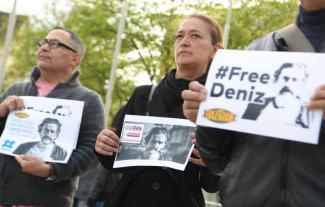Authoritarianism
Post-referendum repression

Turkey’s ranking is 155th of 180 countries in the World Press Freedom Index that Reporters Without Borders published in April. One year ago, it had been 151st.
Since late 2012, the international non-governmental organisation has been calling Turkey “the world’s biggest prison for journalists”, indicating that 72 media personnel were being detained at the time. In the meantime, the number had risen to 160, as Kamil Taylan, a Turkish-German TV journalist, told the independent Round Table for Intercultural Media-Dialogue in Frankfurt at the end of April.
All of the accused media workers are blamed for terrorism, according to Taylan, although the criminal charges are flimsy. There is neither proof of media workers being members of illegal groups nor evidence of explicitly endorsing them, so they are said to be guilty of displaying “supportive attitudes”, for instance on Twitter. Moreover, Taylan reports, many charge-sheet paragraphs are identical and must have been compiled in a copy-and-paste manner.
Typically, the accused journalists are accused of supporting both the Kurdish PKK and the Gülenist movement, Taylan points out. To independent observers, that claim does not make sense. The PKK and the Gülenists do not have much in common, apart from opposing the AKP government (see comment by Timur Tinç in D+C/E+C e-Paper 2017/02). Obviously, dissent now equals terrorism in the eyes of the Turkish government.
“There simply is no rule of law in Turkey”, Taylan says. Erkan Pehlivan, another journalist based in the Frankfurt area, agrees. He reports that 4,300 judges and state prosecutors were suspended after the coup attempt last July, and many of them were detained. The government does not feel bound by the law, he argues, and appoints judges as it pleases. At one point, for example, it turned 900 lawyers into judges in a matter of hours, and 800 of them were AKP members or supporters.
In some ways, Pehlivan feels reminded of Turkey’s brutal military dictatorship in the 1980s. Back then, security forces were known to use white Renault cars to abduct dissenters, many of whom thus “disappeared” forever. In recent weeks, according to Pelivan, eight people were taken away in VW vans in Ankara, and reports of torture and rape in custody are occurring once more, as they did in the 1980s.
In the last days of April, the government carried out yet another purge of the police. As Pehlivan summarises, 9,000 police officers lost their jobs, and 1,000 of them were immediately detained, with the government issuing arrest warrants for another 2,000.
President Recep Tayyip Erdogan promised to bring “stability” to Turkey if voters approved a new constitution in the referendum held on 16 April. He won a narrow victory, but obviously does not feel reassured. His government immediately extended the state of emergency that has been in force since the coup attempt.
According to the official data, a mere 51.4 % of the referendum ballots were cast in favour of the new constitution. The main opposition party, however, claims that the results were manipulated. International observers have also pointed out procedural flaws. European election monitors criticised a last minute decision by the government to allow unstamped ballots because this step undermined an important safeguard. They also pointed out that the referendum was an uneven contest, as the closure of media houses and the detention of journalists ensured that opposing voices were not heard.
Human Rights Watch similarly stated that the campaign took place “in a highly repressive climate”. Hugh Williamson of Human Rights Watch appealed to president and government to “end the state of emergency and the repressive campaign against the media and the pro-Kurdish political opposition.”
Erdogan seems unimpressed. His government blocked access to Wikipedia, the online encyclopedia, on 29 April and purged another close to 4,000 civil servants from ministries and judicial bodies.
Links
Reporters Without Borders:
https://rsf.org/en/turkey
Human Rights Watch:
https://www.hrw.org/news/2017/04/17/turkey-end-state-emergency-after-referendum









